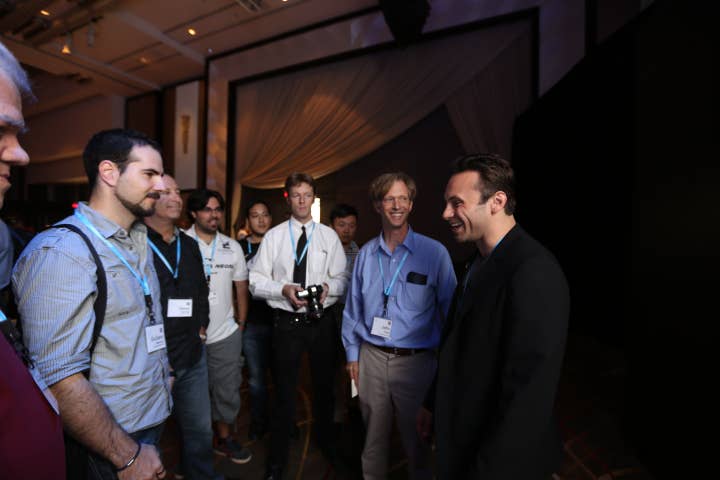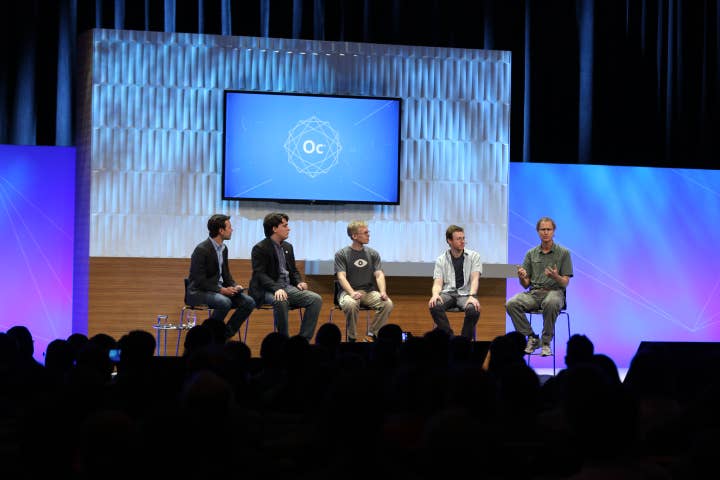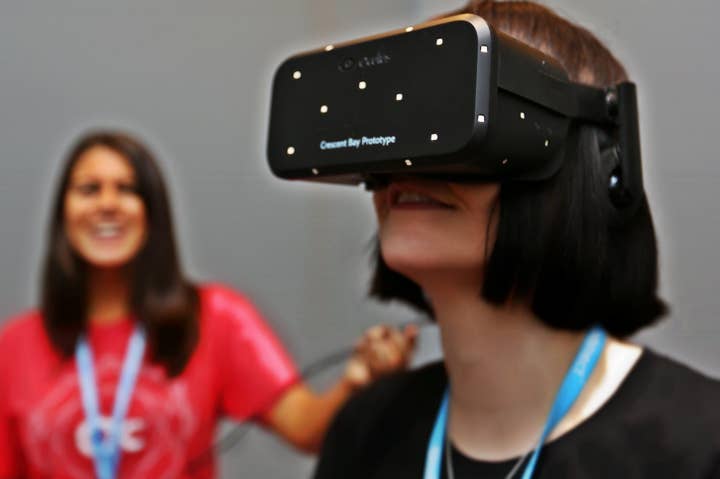Oculus Connect: A love letter to developers
Crescent Bay, chocolate covered bacon and making developers the star
If you're going to serve chocolate covered bacon during the keynote at your company's first ever developer conference, you need to know that what you're going to reveal can beat sugar, salt and fat in the eyes of a hungover games developer. Luckily, Oculus VR was more than prepared with the new Crescent Bay headset, a massive leap forward in virtual reality's capabilities.
As it was announced, phones lit up throughout the keynote audience, indicating a nudge from the dedicated Oculus Connect app to book a demo then and there. And people did, queuing up in the halls of the hotel quietly, then tumbling out of demo rooms a few minutes later, hair skew-whiff, giddy and babbling about dinosaurs and bullets. If anyone managed to play it cool they weren't in either of the demo sessions I attended. (No, I didn't see any signs of sickness either, though I did notice - perhaps entirely coincidentally - more carefully lined plastic wastepaper baskets than seemed normal for a hotel corridor.)

What Oculus VR seems to have cracked with this latest headset (complete with integrated audio, a better screen and improved sensors) is the sense of "presence," a touchstone for the company. It's that moment when the caveman part of your brain overrides its modern day counterparts and makes you feel as if you really are on that ledge, or dodging that bullet, or nestled uncomfortably close to that T-Rex's genitals. I've used an earlier prototype of the Rift before but this exceeded that in every way. I feel like Oculus VR removed my scepticism the first time around, with this new experience they've made me an evangelist.
"We want people to remember that the first Oculus Connect was the moment that they experienced 'presence' and really knew that VR was going to work and be huge, and be much bigger than anyone expected," CEO Brendan Iribe told GamesIndustry.biz, as part of a larger interview that will run this week.
And that was the vibe of the whole event, one of excitement and possibility. The faces, while mostly belonging to males, showed a diversity of age that mirrors that found in Oculus itself - from the upsettingly young Palmer Luckey to old hands John Carmack and Michael Abrash. I spotted Bossa Studios' Henrique Olifiers and CCP's Hilmar Veigar Pétursson strolling between panels and film director Werner Herzog was recognised by a few star-struck attendees. People had turned up with demos to show off in lobbies and corners, Carmack roamed the demo rooms chatting the language of interlacing and the mobile Gear VR, the sessions were pleasingly technical and the keynotes had the intense, prophetic feel of a church sermon.
This is key to the future of Oculus, and is something that the CEO Brendan Iribe and VP of mobile Max Cohen are completely transparent about. They're creating a platform that will live or die by the content created for it. Its responsibility isn't just a technical one but one of support and curation. If Connect was anything to go by, it's one they take very seriously.
"This is a developer conference," Cohen told me. "We could have done this very differently. We could have done this as more of a mass-market conference. We could have reserved three times the amount for media instead of what we did."
Iribe agreed, "a lot of what will be remembered most in VR is going to be non-Oculus based, what you remember is Doom or Quake or one of these pieces of content, you don't remember VoodooFX."

The developers I saw and spoke to, from indies to teenagers to production companies working with big brands, were all overwhelmingly positive - every one had an idea for a virtual reality experience they wanted to create. There was talk of riding Nyan cats through the sky, whilst a neuroscientist queuing for the bar was hoping to use the technology as a therapy for dementia patients. And for every developer that was there, there were plenty more that wanted to be. "We are at super capacity. I'm getting emails, unfortunately people that didn't register and can't make it," said Cohen.
Facebook was a presence but a subtle one, the odd sticker on an organiser's laptop, a flash of the company name on a name badge. Arielle Zuckerberg was rumoured to be in attendance but if so her role was just as another attendee dashing between the Dolby Theatre and the demo cubicles.
We still don't have a release date for any consumer units and it's hard to predict what this event will mark when we look back in five, ten years time. The very first celebration of a new medium that, beyond anything that's come before, will change how we make and play games? Or a brief and exciting anomaly in the timeline of an otherwise risk averse industry, churning out shooters and sports until the apocalypse arrives? If I had Facebook's money, I'd bet it on the former.

